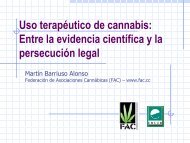Les Rencontres de Biarritz 2007 - THS 10
Les Rencontres de Biarritz 2007 - THS 10
Les Rencontres de Biarritz 2007 - THS 10
Create successful ePaper yourself
Turn your PDF publications into a flip-book with our unique Google optimized e-Paper software.
COGNITIVE IMPAIRMENT CHANGE IN ALCOHOL-DEPENDENT SUBJECTS<br />
AT 3-MON<strong>THS</strong> POST-DETOXIFICATION. BORDEAUX, FRANCE, 2006.<br />
RÉSUMÉ / ABSTRACT<br />
REVIRIEGO E<br />
AURIACOMBE S<br />
FLEURY B<br />
FATSÉAS M<br />
AURIACOMBE M<br />
Alcohol-<strong>de</strong>pen<strong>de</strong>nt subjects may have cognitive impairment related to frontal lobe dysfunction.<br />
We hypothesized improvement after abstinence. Objective: To assess at 3-months post<strong>de</strong>toxification<br />
the evolution of executive, attentional and memory functions among alcohol<strong>de</strong>pen<strong>de</strong>nt<br />
patients.<br />
Method: Subjects were inclu<strong>de</strong>d from patients admitted consecutively for inpatient alcohol<br />
<strong>de</strong>toxification from February to April 2006. They were assessed at intake and 3 months later.<br />
Patients with severe psychiatric disor<strong>de</strong>r, HIV or HCV positive serology, past head injury, substance<br />
use other than alcohol, tobacco and sedatives were exclu<strong>de</strong>d. In the absence of acute<br />
withdrawal symptoms, they were administered a battery of common neuropsychological tests.<br />
Substance use and other confounding factors were controlled using the Addiction Severity<br />
In<strong>de</strong>x and the Mini International Neuropsychiatric Interview.<br />
Results: 6 males were inclu<strong>de</strong>d. At 3 months, 4 were still abstinent and 2 had relapsed but not<br />
to their prior level. Regardless of baseline performance, all subjects improved in all tests but<br />
abstinent subjects had a greater improvement. For relapsed subjects, main improvement was<br />
found for psychomotor speed. Abstinent subjects had better inhibition and higher improvement<br />
of both visual-motor integration and strategic episodic retrieval processing. Severity of <strong>de</strong>pen<strong>de</strong>nce,<br />
length of alcohol use, use of other substances, both psychiatric and somatic co-morbidities<br />
did not seem to be associated with performance of any test in this small sample.<br />
Conclusion: Alcohol seemed to be the main factor implied in the evolution of cognitive functions.<br />
Consi<strong>de</strong>ration needs to be given to routine incorporation of cognitive testing in alcohol<br />
<strong>de</strong>pen<strong>de</strong>nce. Findings from these preliminary results are encouraging, but have to be confirmed.<br />
MOTS CLÉS / KEYWORDS<br />
Non communiqué...<br />
E. Reviriego, S. Auriacombe, B. Fleury, M. Fatséas, M. Auriacombe<br />
Addiction Psychiatry, JE2358, INSERM IFR 99, University Victor Segalen Bor<strong>de</strong>aux 2, Bor<strong>de</strong>aux, France.<br />
Cognitive neurology, Neurology Department, Bor<strong>de</strong>aux University Hospital, Bor<strong>de</strong>aux, France.<br />
153
















